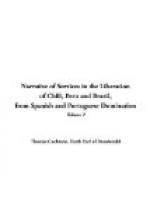I however landed a small detachment for the purpose of ascertaining the means of defence, as well as in the hope of exciting the authorities on shore to some degree of activity in their own cause. In case of attack, I promised to disembark for their assistance the whole of the men who could be spared; at the same time giving permission to withdraw to the ships in case of sudden emergency, which might not admit of communication with me in time.
This offer produced the best effect in the city, giving confidence to the well-affected, whilst, as the discontented were ignorant of the extent of aid that could be afforded, they deemed it wisest to keep quiet. On the following day, the inhabitants returned to their allegiance, the officiating President hoisting the Imperial flag on the ramparts with his own hands, amidst every demonstration of general satisfaction.
I next caused despatches to be sent to all quarters of the province, announcing the return of the city to its allegiance, promising oblivion of the past to all who followed the example, and this was succeeded by a general acknowledgment of the Imperial authority. Confidential agents, entrusted with similar despatches, were likewise sent to the revolutionary forces headed by Bizarra, the rebel General-at-Arms, the whole of whose troops abandoned him; whilst, by similar agency, the corps, under the immediate command of the revolutionary president, Araripe, was reduced to a hundred men—even the Indians, without exception, abandoning his standard.
As one of the first steps towards the pacification of the province, I had published not only a general amnesty, but also a particular amnesty, offering to the insurgent leaders themselves especial pardon, from which, in ordinary general amnesty, they might otherwise imagine themselves excluded, I had, in my own mind, determined upon this as a general course to be pursued, as I could not but see that, in the outset of the revolt, both insurgents and leaders had good cause to be dissatisfied with the central Government at Rio de Janeiro. I had even addressed a letter personally to the revolutionary president, Araripe, remonstrating upon the folly of the course he was pursuing, and promising my protection to himself, as well as to the other revolutionary leaders, if they would return to their allegiance. He chose rather to withdraw into the interior, with the discontented who adhered to him, intending, no doubt, to wait till the naval force had retired. Foreseeing the danger of this, I issued a proclamation, offering a reward for his capture, sufficient to induce the Indians who had previously been his supporters to proceed in quest of him, the result being that he himself was killed, and the whole of his followers captured. The Indian chiefs, as well as their dependants, were of great service in the restoration of order, combining superior bodily strength and activity, with energy, docility, and unfailing power of endurance —forming, indeed, the best specimens of the native race I had seen in South America.




